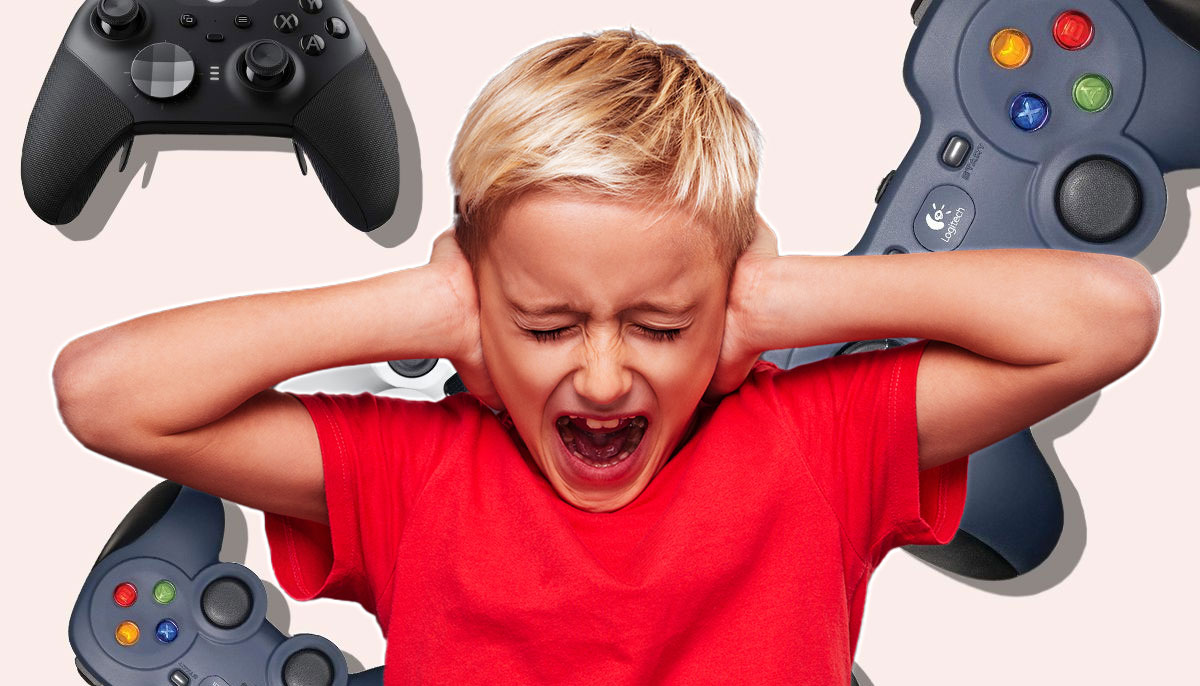
10 Ways to Reduce Gamer Temper Tantrums
Temper tantrums are no longer only experienced by toddlers going through the ‘terrible twos’. This type of emotional outburst can affect gamers too, especially if their lives are dominated by video games. As experts in video game addiction, we’re often asked for advice on how to reduce temper tantrums that are triggered by gaming.
In this article, we answer some common questions about gamer temper tantrums and suggest 10 strategies to deal with them.
Common questions about gamer temper tantrums

What is temper tantrum behavior?
Sometimes referred to as gamer rage, temper tantrum behavior can manifest in different ways, including shouting, screaming, cursing, threatening, overreacting, lashing out, and throwing or breaking objects.
What is the difference between a tantrum and a meltdown?
Although ‘tantrum’ and ‘meltdown’ are often used interchangeably to describe the type of behavior described above, a tantrum is usually a conscious choice, whereas a meltdown is a reaction the gamer can’t control.
At what age are tantrums normal?
Gaming-induced temper tantrums can affect people of any age, especially tweens, teens, and young adults whose prefrontal cortex — the part of the brain responsible for impulse control—isn’t fully developed. (Sometimes we’re asked more specific questions like, ‘Is it normal for a 7-year-old to have meltdowns?’ and the answer is the same.)
Does too much screen time cause tantrums?
Yes, spending a lot of time online can cause tantrums as players are more likely to experience something that sets them off, from a slow or broken Wi-Fi connection to losing a match in a multiplayer game, or even due to their gaming-induced flow state being interrupted by a caring parent. Excessive screen time can also lead to worse symptoms of ADHD, or trigger rigid patterns in individuals with autism making these underlying conditions more difficult to manage.
Are violent tantrums normal?
If no steps are taken to rein in their behavior, occasional angry outbursts can increase in frequency and severity into violent temper tantrums. Parents on our Video Game Addiction Parents Facebook Support Group have shared stories of intense rage that have caused damage and destruction in the family home.
Hi. We took away my 13 yo son’s computer 4 days ago. We had to do it. All he does is play Fortnite. It’s a battle everyday to get him up and off to school, he’s failing in school, even though he has the academic skills. He’s just not doing his work and turning it in… he’s doesn’t care. We can hardly get him to shower and brush his teeth. He comes home from school and immediately gets on the computer and stays on until 9:00 at night, we have to force him off (which he is angry about). On the weekends, he will play 12 hours a day, unless he has plans with friends. He never wants to do anything with his family anymore. We can’t get him to do any physical activity, the list just goes on…
So here’s what is happening in our home after we took it out of the house. Initially he raged and became very violent. He broke picture frames, glasses, threw a chair, etc. after about a hour of swearing and screaming at the top of his lungs, he started crying. Then finally settled down. He’s very angry with my husband and I. I’m still getting verbal abuse and threats of suicide. He won’t do anything. All he can think about is getting his computer back. It’s very hard right now.
If safety is ever a concern in your home, you should seek the assistance of your local emergency services immediately.
10 strategies to deal with gamer temper tantrums

1. Take regular breaks
Playing video games for hours can leave a gamer feeling stressed and annoyed, making them more inclined to have temper tantrums. This could be for a number of reasons, such as the types of games they’re playing, toxic interactions with other players, or because they’re exhausted. Whatever the cause, taking regular breaks will not only boost their mood—and help prevent eye strain, fatigue, headaches, and other issues—it may also enhance their performance.
2. Get more sleep
Although taking regular breaks may help players feel less tetchy and exhausted, getting more sleep will have the most impact on their mood. Sleep deprivation can be highly debilitating, especially if it happens regularly, and you’ll notice that they become snappier and more short-tempered. Having a regular bedtime, aiming for eight uninterrupted hours of sleep a night, and avoiding daytime naps will help your gamer better control their emotions. And if they do still have occasional tantrums, it will be easier to reason with them.
3. Refuel and refresh
Video games can be highly addictive, so it’s unsurprising that some players become totally engrossed in the action and skip mealtimes. If their blood sugar dips, they’re more likely to get short-tempered and irritable, which is why healthy food choices, eating regularly, and staying hydrated are important to regulate their mood.
4. Avoid games that punish players
Game designers use a variety of tactics to keep gamers coming back for more. Several popular titles, including Candy Crush and FarmVille, punish players for not engaging with the game. For example, in Farmville, crops wither and die if not harvested. Players can become agitated if they’re not allowed to spend money on ‘unwithering tools’ or log into the game each day. One way to prevent unwanted outbursts is to avoid these types of games.
5. Choose non-violent games
According to research, violent video games are a risk factor for antisocial behavior. Unsurprisingly, games like Call of Duty and Mortal Kombat, which are heavily focused on murder and mayhem, are more likely to induce tantrums and rage than non-aggressive video games like Minecraft and FIFA. Parents should consider age ratings and look for games that provide fun and excitement without exposure to violence.
6. Find replacement activities
Video games are usually harmless if played in moderation, especially when balanced with other hobbies. Replacing gaming with real-life fast-paced activities like dancing, exercise, or sport will help their emotional regulation and physical health. For gamers trying to reduce their unhealthy relationship with video games, doing something different away from screens will distract them from boredom and cravings. You’ll notice that as they start to embrace other interests, their behavior will improve.
7. Set house rules
Whatever the age of your gamer, if they live in your home, they should respect your rules. Be clear about what is and isn’t acceptable and stand firm, even when they have a meltdown. The sooner they accept and understand the boundaries, the more likely they are to realize that pushing against them will have no effect. Other parents have introduced the following rules:
- All gameplay must be in communal areas of the house.
- No phones in the bedroom at night.
- No gaming at mealtimes.
- No gaming during the hour before bed.
8. Try relaxation techniques
If your gamer lashes out regularly, suggest some relaxation techniques to help diffuse their anger and frustration in stressful situations. These could range from
- Downloading a guided breathing app.
- Listening to their favorite songs.
- Playing a musical instrument.
- Repeating a phrase like “let’s chill out” or “I’m taking it easy”.
- Writing a gratitude journal to focus on positive areas of their life.
- Meditating to clear their mind of angry thoughts.
9. Look after yourself
When gamers behave badly, parents tend to focus all their time and energy on avoiding these outbursts and diffusing the situation when things start to unravel. But don’t forget your own health and well-being while you’re navigating this minefield. Nurture yourself with clean eating, exercise, and rest periods. Talk to someone you trust or join the Game Quitters parent group on Facebook for support, advice, and coping strategies.
10. Take our video addiction test
If you’ve tried the above tips and your gamer is still having temper tantrums, they may be addicted to video games. But if you try to reduce their screen time or remove their devices, this can make the situation worse in the short term. In fact, their continued angry outbursts may be providing your gamer with some of the dopamine rush their body and brain are missing from not playing video games. Take our video game addiction test, and if their behavior meets the criteria for addiction, get in touch to discover how to reduce screen time without tantrums.
Need help?

Are you worried that your gamer’s temper tantrums may escalate into physical violence? Perhaps they’ve already started lashing out or throwing and breaking objects. Whatever the situation, now’s the time to act. And tackling their unhealthy relationship with gaming is the first step to restoring harmony at home.
At Game Quitters, our RECLAIM family program has helped thousands of people to reduce anger and conflict, manage problematic gaming, and reconnect with their loved ones.
Book a call to discuss what’s going on with your gamer and how we can help get their temper tantrums and gaming habits under control so you can start rebuilding your relationship.
Even if your gamer refuses to accept they have a problem, we have a system to take them from denial to acceptance.
Please note that spaces are limited, and we’re unable to accept all applicants.
